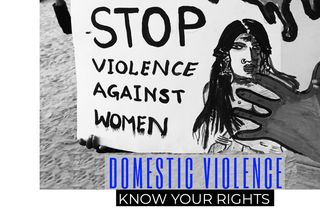
Know Your Rights: Navigating Domestic Violence Laws in India
An advocate explains what legal recourse is available to domestic violence survivors and how they can best access it.

In Know Your Rights, we simplify the rights you’ve been given, so you know how to exercise them.
In India, more than 30% of women have been subjected to domestic violence at some point in their lives, per the National Family Health Survey (NFHS) data. Yet, nearly 75% of those who reported being subjected to domestic violence did not seek help from anyone. For those who do, by confiding in close family members, the crime often gets brushed off as a private or family matter that doesn’t require outside, legal intervention.
This response can trap women in abusive situations. Various studies have highlighted the effects of being in an abusive relationship — women who survive intimate partner violence are not only 10% to 25% more likely to be broke, but survivors are also likely to, “… carry the scars from [domestic violence] for a long time, and those scars can create barriers to forming new relationships.”
Therefore, we roped in Siddharth Chandrashekhar, LL.M., a practicing advocate at the Bombay High Court, to take us through the laws and rights of victims of domestic violence.
What acts qualify as domestic violence?
Any act consists of domestic violence when it harms or endangers the health, safety, life, limb, or wellbeing (mental or physical) of the victim, or tends to do so, and includes causing: physical abuse, sexual abuse, verbal abuse, emotional abuse, and economic abuse.
Is domestic violence a legally punishable offense?
Yes.
Is domestic violence a crime only when it is perpetrated by a spouse?
No, domestic violence can be perpetrated by any person who is or was in a domestic relationship with the victim; it is a domestic relationship when two people who live, or have at any point of time lived, together in a shared household, or when they are related by blood or through a relationship in the nature of marriage or adoption.
Is domestic violence an offense only when a woman is harmed?
Only a woman who is/was in a domestic relationship with the aggressor can take action under the Protection of Women from Domestic Violence Act, 2005.
While the statute specifically defines the aggressor as “any adult male person,” a number of Supreme Court judgments have held that even a woman can be an aggressor against another woman for committing and/or aiding and abetting acts of domestic violence.
Related on The Swaddle:
Can a woman who has not been harmed take action on behalf of her minor children, if the children are being abused?
Yes, she can. As the natural and legal guardian of her children or the children under her care, she has very right to take action.
If I have experienced domestic violence, what is my first legal recourse?
A first, legal step would be to approach the police for help or to seek the help of a Protection Officer, appointed by the government to assist victims of domestic violence. You can also file a complaint before the Magistrate’s Court, a Family Court or the District Court within the jurisdiction of where the act(s) of domestic violence has taken place or where you reside. In taking any of these steps, you will need to be prepared to narrate the acts of domestic violence committed against you in order to seek remedial action from these authorities.
Is it better to approach a women’s organization or NGO first, or the police?
Approach the organization or authority that is most easily accessible. It may be useful to consult a lawyer and/or have the support of an NGO or a woman’s rights organization in such matters.
What can I do if the police fail to file an FIR, saying my case doesn’t fall under their jurisdiction?
The police are duty-bound to register an F.I.R. even if it doesn’t fall within their territorial jurisdiction. After recording an F.I.R., the police authorities may transfer it to the police station under the proper jurisdiction. However, if they fail to do so, you can approach the court having jurisdiction over the particular police station where the F.I.R. has been recorded.
What is the usual procedure followed once I make a legal complaint?
Once a complaint is lodged, notices are issued to the aggressor(s) and after hearing them, necessary orders and directions will be passed by the Court.
In cases of extreme urgency and imminent threat to the victim, special orders may be passed by the court at the first hearing itself.
Related on The Swaddle:
Know Your Rights: Miscarriage Leave in India
What kind of help will I get once I file a complaint?
The Protection Officer and the court will take steps to prevent any further acts of domestic violence and to ensure the safety and wellbeing of the victim concerned.
What if I don’t have resources to move out of the house and I’m still being subjected to violence even after making a complaint?
The victim need not move out of the house and, in fact, can even get a protection order from the court barring the aggressor from dishousing her. In some cases, the court has even directed the aggressor to move out of the house irrespective of who owns it.
Who can cover my medical expenses if I don’t have enough money or access to it to fund it myself?
The aggressor can be directed to pay for medical expenses.
What if the offender and their family deny charges completely, and I don’t have any way to prove their acts of domestic violence?
Acts of domestic violence are seldom committed in public view or in broad daylight. However, if a victim’s testimony and the evidence before the authorities stand the test of cross-examination, it is ideally sufficient proof of an act(s) of domestic violence. This is, of course, a subjective standard, and may differ from case to case.
Will my complaint have any effect on my children?
This is subjective and differs from case to case. Children are, sadly, collateral damage in family and matrimonial disputes. As far as possible, children should be insulated from disputes and complaints unless they are survivors of domestic abuse themselves.
Once a case is concluded and the offender has been directed not to commit further acts of violence — but continues to do so — what can I do?
The court can remove the aggressor from a place or position so that he can no longer commit acts of domestic violence against the survivor. The aggressor may also be given a jail term in accordance with the law, or the court may initiate an action of contempt of court for disobeying its orders.
Anubhuti Matta is an associate editor with The Swaddle. When not at work, she's busy pursuing kathak, reading books on and by women in the Middle East or making dresses out of Indian prints.
Related


Indian Chemists Are Not Stocking Medical Abortion Pills Anymore, Putting Millions of Women at Risk
